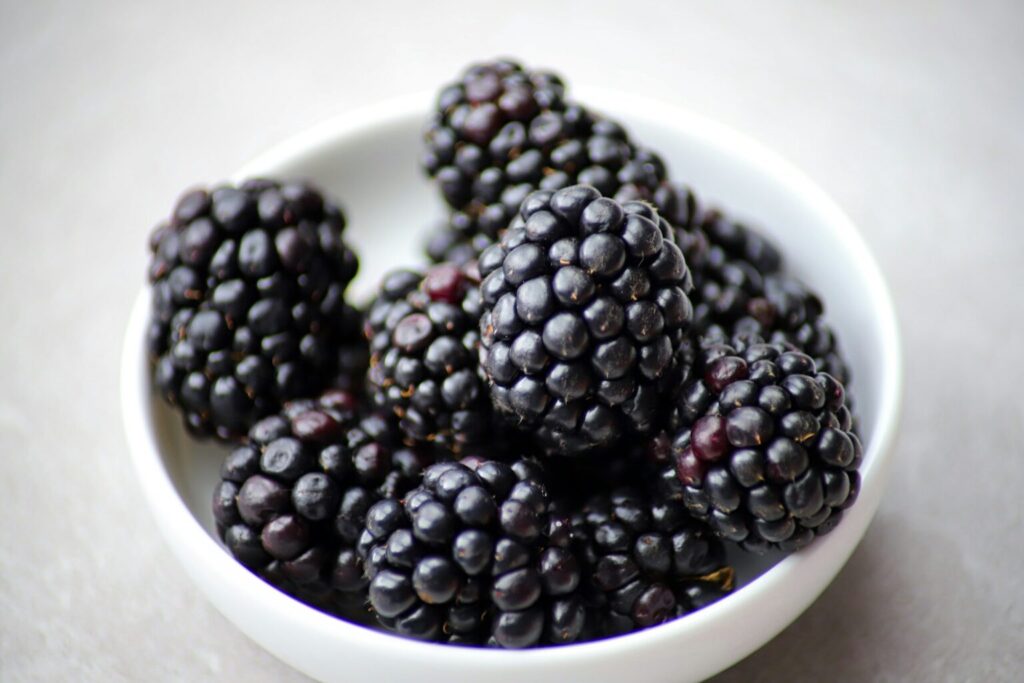Blackberries, with their deep purple hue and sweet-tart flavor, are more than just a delicious summer treat. These small, juicy berries are packed with essential nutrients and antioxidants, making them a powerhouse of health benefits. Whether enjoyed fresh, frozen, or in your favorite recipes, blackberries are a versatile and nutritious addition to any diet.
In this blog post, we’ll explore the nutritional benefits and healthy properties of blackberries and why they deserve a spot on your plate.
What Are Blackberries?
Blackberries are aggregate fruits that belong to the Rubus genus, part of the Rosaceae family, which also includes raspberries and strawberries. They grow on thorny bushes and are typically in season during the summer months. Blackberries are known for their rich color, which comes from anthocyanins, powerful antioxidants that provide many of their health benefits.
Nutritional Profile of Blackberries
Blackberries are low in calories but high in essential vitamins, minerals, and antioxidants. Here’s a breakdown of their nutritional value per 1 cup (144 grams):
- Calories: 62
- Fiber: 8 grams (32% of the Daily Value)
- Vitamin C: 30 mg (50% of the Daily Value)
- Vitamin K: 29 mcg (36% of the Daily Value)
- Manganese: 0.9 mg (47% of the Daily Value)
- Folate: 36 mcg (9% of the Daily Value)
- Antioxidants: Including anthocyanins, ellagic acid, and quercetin.
Blackberries are also rich in water, making them hydrating and refreshing.
Health Benefits of Blackberries
- Rich in Antioxidants
Blackberries are loaded with antioxidants like anthocyanins, which give them their dark color and help protect cells from oxidative stress. These compounds may reduce the risk of chronic diseases like heart disease, cancer, and diabetes. - Supports Digestive Health
With 8 grams of fiber per cup, blackberries are an excellent source of dietary fiber. Fiber promotes healthy digestion, prevents constipation, and supports a balanced gut microbiome. - Boosts Immune Function
The high vitamin C content in blackberries strengthens the immune system, helping your body fight off infections and illnesses. - Promotes Heart Health
Blackberries contain heart-healthy nutrients like fiber, potassium, and antioxidants. These compounds help lower cholesterol, regulate blood pressure, and reduce inflammation, supporting overall cardiovascular health. - Supports Brain Health
The antioxidants in blackberries, particularly anthocyanins, may improve cognitive function and protect against age-related memory loss and neurodegenerative diseases like Alzheimer’s. - May Aid in Cancer Prevention
Blackberries contain ellagic acid and other compounds that have been shown to inhibit the growth of cancer cells and reduce inflammation, potentially lowering the risk of certain cancers. - Improves Skin Health
The vitamin C and antioxidants in blackberries promote collagen production, protect against UV damage, and reduce signs of aging, keeping your skin healthy and radiant. - Supports Bone Health
Blackberries are a good source of vitamin K and manganese, both of which are essential for maintaining strong bones and preventing osteoporosis. - Helps Regulate Blood Sugar
The fiber and antioxidants in blackberries can help stabilize blood sugar levels, making them a great choice for individuals with diabetes or those looking to manage their blood sugar. - Anti-Inflammatory Properties
The antioxidants in blackberries help reduce inflammation in the body, which can benefit conditions like arthritis, metabolic syndrome, and inflammatory bowel disease.
How to Enjoy Blackberries
Blackberries are incredibly versatile and can be enjoyed in many ways:
- Fresh: Eat them on their own as a refreshing snack.
- Smoothies: Blend blackberries with yogurt, spinach, and a banana for a nutrient-packed smoothie.
- Salads: Add blackberries to salads for a burst of flavor and color.
- Desserts: Use them in pies, cobblers, or parfaits for a healthy and delicious treat.
- Oatmeal or Yogurt: Top your breakfast with fresh blackberries for added sweetness and nutrition.
- Frozen: Use frozen blackberries in smoothies or baked goods.
Tips for Selecting and Storing Blackberries
- Choosing Fresh Blackberries: Look for plump, firm berries with a deep, even color. Avoid berries that are mushy or have mold.
- Storing Fresh Blackberries: Store blackberries in the refrigerator and wash them just before eating to prevent spoilage. They typically last 2-3 days.
- Freezing Blackberries: Spread fresh blackberries on a baking sheet, freeze until solid, and then transfer to a freezer-safe bag. They can last up to 6 months in the freezer.
Potential Side Effects
Blackberries are generally safe for most people, but there are a few considerations:
- Allergies: Some individuals may be allergic to blackberries or other berries.
- Oxalates: Blackberries contain oxalates, which can contribute to kidney stones in susceptible individuals.
- Pesticides: Conventionally grown blackberries may contain pesticide residues. Opt for organic varieties when possible.

Blackberries are a delicious and nutrient-dense superfruit that offers a wide range of health benefits. From boosting immunity and supporting heart health to promoting glowing skin and improving digestion, these little berries are a powerhouse of nutrition. Whether you enjoy them fresh, frozen, or in your favorite recipes, blackberries are a simple and tasty way to enhance your overall well-being.
So, the next time you see blackberries at the market, grab a pint and savor the sweet-tart flavor of this incredible superfruit. Your body will thank you!
How do you like to enjoy blackberries?
Share your favorite recipes and ideas in the comments below! 🖤

